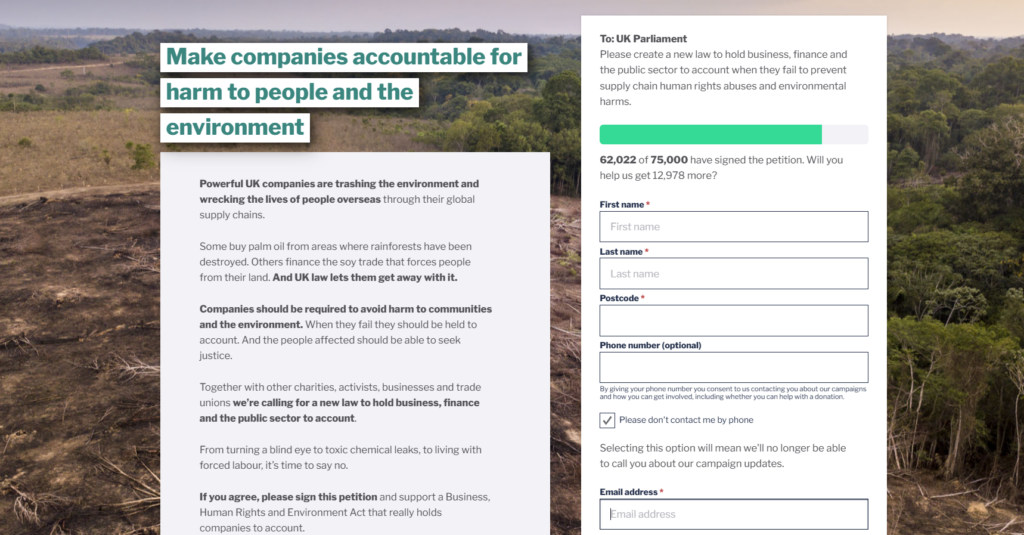By Anna Smith
Planet over Profit is Friends of the Earth’s tactical effort to hold corporations to account for their lack of sustainability awareness and harm on the planet through the exploitation of products/processes which harm both people and planet. We’ve put together this helpful summary guide to help you understand what resources and key corporations are targets to avoid, so you can help contribute to better practices at local level.
- Friends of the Earth has made a solidified commitment to shine light on the shady practices of corporations alongside their harmful impact on communities in poorer countries, who bear the hardest brunt of deforestation, land destruction and displacement.
- Camden Friends of the Earth intends to make a commitment to this campaign. We would love and appreciate Camden residents to engage with our campaign in order to raise awareness for these shady tactics and require companies to undertake assessments of their supply chains so their sustainability practices remain transparent and harm is reduced.
- What resources are harming both people and planet?
- Wood and Deforestation – Illegal logging persists as a huge threat to tropical forests, their inhabitants, communities and wildlife. This relates directly to the actions of corporations, since UK timber supply chains are linked to the companies that profit from them; top offenders include Drax, a power plant, who burn wood pellet imports, and Ikea, who are the largest wood consumer globally, converting it for furniture purposes. Ensuring a sustainable tree and timber industry in the UK is one step we can take to protect human rights abuses.
- Palm Oil – This stuff is the world’s most used vegetable oil, and the UK consumes about 1 million tonnes of it yearly. Some of the companies involved in its production are actually owned by companies in the UK, such as the AAL, whose actions have forced communities in Sulawesi to disperse, fires, drastic increases in carbon emissions and occupation of land for farming purposes.
- Soy – This is a major cause of deforestation in South America, causing biodiversity to dwindle and plants to be damaged by herbicide pollution. In the UK, the company Cargill is the largest in the trade of soy. They supply to giants like McDonald’s and Tesco, and in the last 10 years over 12,000 fires have occurred on their owned land or owned by Cargill suppliers.
- Fast Fashion – Fast fashion accelerates textile and plastic pollution through materials such as polyester, which offer cheap but difficult to recycle items, often produced by women of colour in unsafe conditions overseas for poverty wages. These items end up polluting our landfill, eventually also polluting water sources and rivers when landfill overflows. Boohoo has come under fire for their inhumane business standards in Leicester.
- We can all do our best to avoid and stand up against fast fashion by choosing second-hand shops, charity shopping, avoiding extremely cheap items, upcycling tired garments into new and fresh items and recycling unwanted clothing.
You can have your say here with Friends of the Earth’s petition against big businesses dominating natural spaces with their unnatural practices. Make companies accountable for harm to people and the environment

What has already been done in campaigning in wider FoE?
– Manchester Friends of the Earth have engaged with concert-goers about the campaign, collecting 800 new signatures
– There have been demonstrations at Unilever’s headquarters and Merseyside factory against their unethical practices.
– Our allies in Friends of the Earth Indonesia have pioneered the concept of forest management for timber protection.
How can local action contribute to global results?
Even just sharing our petition with five members of your community, you can help to reduce the amount of waste and plastic pollution in Camden’s water reservoirs from further afield, the number of trees chopped down, and the amount of farming-based fires by having your say and demanding from big businesses that a new UK law be set in place. Make companies accountable for harm to people and the environment.
- Other things you can do to stand up to big business for PoP:
– Engage with clothing swaps with friends
– Shop at Camden’s local charity shops – we have a previous blog post on some our favourites here.
– Research sustainable food and meal planning to incorporate into your diet – for more information or tips on what better meat is, follow to this article.
– Avoid shopping at culprit corporations where possible – by reducing engagement, you can support local businesses for food, hospitality and goods as a means of directing support towards local individuals and avoiding providing monetary support towards shady businesses with unethical environmental practices.
– Avoid over-consumption of wood or paper-based products
– Take to social media to express your support for our campaign.
We’ve also comprised a helpful links bank if you’re eager to understand more about the Planet Over Profit initiative and how you can incorporate ethical practices into your everyday life, choosing ethical companies over large corporations:
Why the UK needs a new law to put the planet over profit
The muck map How much factory farm waste does your area produce?
How can I tell if a product is ethical?
How is the UK causing habitat destruction worldwide?
What are supply chains and why do they matter? What’s the environmental impact of critical minerals?
